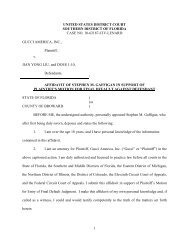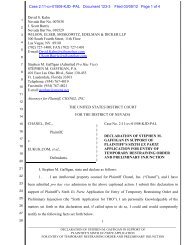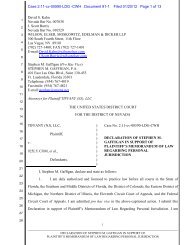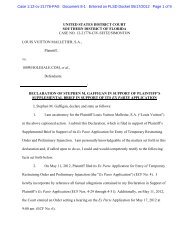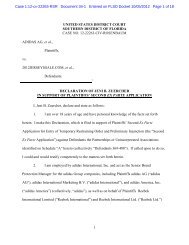UNITED STATES DISTRICT COURT SOUTHERN DISTRICT OF ...
UNITED STATES DISTRICT COURT SOUTHERN DISTRICT OF ...
UNITED STATES DISTRICT COURT SOUTHERN DISTRICT OF ...
You also want an ePaper? Increase the reach of your titles
YUMPU automatically turns print PDFs into web optimized ePapers that Google loves.
Case 0:10-cv-61942-MGC Document 5-6 Entered on FLSD Docket 10/14/2010 Page 63 of 75<br />
reduced or the current price within the scope of the obligations that the person subject to execution should fulfill, however, it shall leave the<br />
articles of daily necessity for the person and his dependent family members.<br />
The people's court shall render an order regarding the adoption of the measures specified in the preceding paragraph.<br />
Article 224. When the people's court seals up or distrains a property, if the person subject to execution is a citizen, it shall notify the person<br />
and an adult member of his family to appear on the scene; if the person subject to execution is a legal person or any other organization, it<br />
shall notify its legal representatives or principal leading personnel to appear on the scene. Their refusal to appear in the scene shall not stop<br />
the execution. If the person subject to execu ion is a citizen, his unit or the grass roots organization in the place where his property is<br />
located shall send people to participate.<br />
An inventory of the sealed up or distrained property must be made by the execution officer and, after the inventory has been signed or<br />
sealed by the persons on the scene, a copy of it shall be given to the person subject to execution or, if the person subject to execution is a<br />
citizen, it may also be given to an adult member of his family.<br />
Article 225. The execution officer may assign the responsibility of safekeeping the sealed up property to the person subject to execution,<br />
and the person shall be held responsible for any losses incurred due to his fault.<br />
Article 226. After a property has been sealed up or distrained, the execution officer shall instruct the person subject to execution to fulfill,<br />
within the prescribed time limit, the obligations specified in the legal document. If the person fails to fulfill his obligations within he<br />
prescribed time limit, the people's court may, in accordance with relevant regulations, entrust the relevant units with the selling of the<br />
sealed up or distrained property at reduced or the current price. Articles which are prohibited from free trading by the state shall be<br />
delivered to and purchased by the relevant units at the price set down by the state.<br />
Article 227. If the person subject to execution fails to fulfill the obligations specified in the legal document and conceals his property, the<br />
people's court shall have the power to issue a search warrant and carry out a search on the person subject to execution and in his domicile<br />
or in the place where the property is concealed.<br />
The adoption of the measures mentioned in the preceding paragraph shall be subject to a search warrant signed by the president of the<br />
people's court.<br />
Article 228. The property or negotiable instrument specified for delivery in the legal document shall be delivered in the presence of both<br />
parties summoned by the execution officer to the recipient, who shall sign a receipt.<br />
Any unit concerned that holds the property or negotiable instrument at issue shall pass it on in accordance with the notice on assistance in<br />
execution of the people's court, and the recipient shall sign a receipt.<br />
If any citizen concerned holds the property or negotiable instrument at issue, the people's court shall notify him to relinquish them. If he<br />
refuses to do so, compulsory execution shall be enforced.<br />
Article 229. Compulsory eviction from a building or a plot of land shall require a public notice signed and issued by the president of a<br />
people's court, instructing the person subject to execution to perform it within a designated period of time. If the person fails to do so wi hin<br />
the given time, compulsory execution shall be enforced by the execution officer.<br />
When a compulsory execution is being enforced, if the person subject to execution is a citizen, the person or an adult member of his family<br />
shall be notified to be present; if the person subject to execution is a legal person or any other organization, its legal representatives or<br />
principal leading personnel shall be notified to be present; their refusal to be present shall not stop the execution. If the person subject to<br />
execution is a citizen, his work unit or the grass roots organization in the locality of the building or the plot of land at issue shall send people<br />
to participate. The execution officer shall make a record of the particulars of the compulsory execution, and the people on the scene shall<br />
affix their signatures or seals to the record.<br />
The people's court shall assign personnel to transport the property involved in a compulsory eviction from a building to a designated<br />
location and deliver it to the person subject to execution or to an adult member of his family; if any loss is incurred due to the person's<br />
refusal to accept the property, he shall be held responsible for it.<br />
Article 230. In the course of execution, if some formalities for certificates transfer need to be gone through, the people's court may issue a<br />
notice on assistance in execution to relevant units, which must comply with the notice.<br />
Article 231. If the person subject to execution fails to fulfill the performance required of him by a judgment or order or any other legal<br />
document as instructed by the notice on execution, the people's court may enforce compulsory execution or entrust the performance to a<br />
relevant unit or other persons, and the person subject to execution shall bear the expenses thus incurred.<br />
Article 232. If the person subject to execution fails to fulfill his obligations in respect to payment of money within the time limit specified by a<br />
judgment or order or any other legal document, he shall pay a multiplied interest on the debt for the period of deferred fulfillment. If the<br />
person subject to execution fails to fulfill his other obligations within the time limit specified by a judgment or order or any other legal<br />
document, he shall pay a surcharge for the deferred fulfillment.<br />
Article 233. After the adoption of the execution measures s ipulated in Article 222, 223 and 224 of this Law, if the person subject to<br />
execution is still unable to repay its debts, it shall continue to fulfill his obligations. Once the creditor discovers that the person subject to<br />
execution has any other property, the creditor may at any time apply to the people's court for execution.<br />
CHAPTER XXIII SUSPENSION AND CONCLUSION <strong>OF</strong> EXECUTION<br />
Article 234. Under any of the following circumstances, the people's court shall order suspension of an execution:<br />
(1) the applicant indicates that the execution may be postponed;



